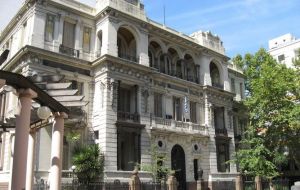MercoPress. South Atlantic News Agency
Human Rights Court calls on Uruguay to remove ‘dirty war’ amnesty law
 Uruguay’s Supreme Court ruled amnesty can be lifted for particularly serious crimes
Uruguay’s Supreme Court ruled amnesty can be lifted for particularly serious crimes Uruguay must remove obstacles to prosecuting human rights offences committed during its “dirty war” in the 1970s, including an amnesty that had protected military and police officers accused of killings, kidnappings or torture, the Inter-American Human Rights Court ruled.
The ruling came in the case of Maria Claudia Garcia, the daughter-in-law of Argentine poet Juan Gelman, who was reportedly abducted in 1976 in Argentina and sent to Uruguay, where she disappeared in the custody of dictatorship-era security forces.
The Organization of American States' human rights court said in a ruling published late Wednesday that Uruguay was responsible for Garcia's disappearance and the existence of the amnesty laws had blocked attempts to find out the truth about the crime.
”The government (of Uruguay) should guarantee that the amnesty law ... never again becomes an obstacle for investigations,” the ruling said.
Both the military and guerrillas were granted amnesty for dictatorship-era crimes as democracy was restored in Uruguay, and the amnesties have been repeatedly upheld in voter referendums.
Uruguay's Supreme Court later ruled the amnesty can be lifted in some cases of particularly serious crimes, but the law remains in place. In October 2009, the high court declared the amnesties unconstitutional, reasoning that only the courts — not the executive branch — can grant amnesty.
Each alleged crime must now be considered by the courts on a case-by-case basis.
A dozen Uruguayan military figures have been prosecuted for crimes against humanity, but all were committed outside Uruguay, particularly in Argentina, where about 150 Uruguayans disappeared.
The Uruguayan military dictatorship lasted from June 1973 to 1984. The ruling opens the way for plaintiffs to demand compensation from the Uruguayan government.




Top Comments
Disclaimer & comment rules-

-

-

Read all commentsIs war criminal Tony Blair in jail?
Mar 25th, 2011 - 03:55 am 0“Argentine ex-general sentenced to life for dictatorship-era killings”
http://www.cnn.com/2011/WORLD/americas/03/24/argentina.dirty.war/index.html?iref=allsearch
It's only our mistakes that count Marcos.
Mar 25th, 2011 - 05:13 am 0http://www.guardian.co.uk/commentisfree/2010/jan/25/bounty-blair-war-criminal-chilcot
To: Marcos Alejandro
Mar 25th, 2011 - 11:57 am 0The article is not about Tony Blair or any other person you may have personal issues with. I am starting to believe that people like you who comment, either can not read or you are here only for propaganda purposes. Get a life a life and quit wasting everyone's time.
Commenting for this story is now closed.
If you have a Facebook account, become a fan and comment on our Facebook Page!